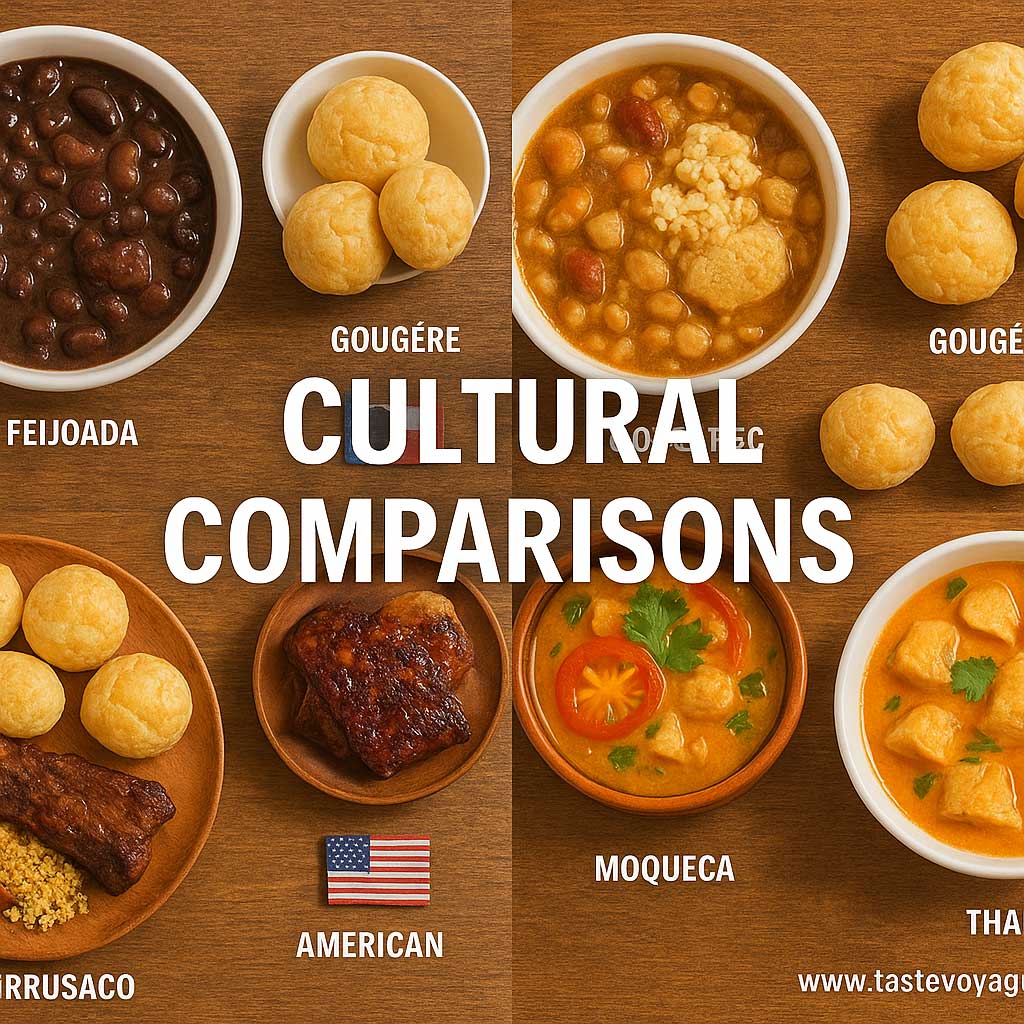Brazilian vs Greek Food Culture: A Delicious Comparison
Travel the World Through Food >> Brazilian Cuisine>>Cultural Comparisons>> Brazilian vs Greek Food Culture: A Delicious Comparison
Brazilian vs Greek Food Culture: A Delicious Comparison
Brazilian vs Greek Food Culture: A Culinary Celebration of Tradition and Flavor
Food is a powerful window into a nation’s soul. It reflects history, geography, climate, and the unique creativity of its people. When we compare Brazilian and Greek culinary traditions, we uncover two vibrant worlds filled with rich flavors, time-honored techniques, and cultural stories that have been passed down through generations. Both cuisines offer a fascinating glimpse into their societies, showcasing how food unites communities and celebrates life.
The Heart of Brazilian Food Culture
Brazilian Cuisine is a lively tapestry woven from diverse regional influences. Its heart lies in using fresh, local ingredients, often featuring hearty staples such as rice, beans, and fresh fruits. Dishes like feijoada—a savory stew of black beans, pork, and spices—embody comfort and conviviality, often enjoyed with family and friends. The cuisine highlights a deep connection to nature, with tropical fruits like guava, passionfruit, and acai adding vibrant flavors and Health benefits.
Brazilian food also embodies a spirit of innovation and celebration. Street Food plays an essential role, with acarajé and coxinha offering quick, flavorful bites that reflect the country’s lively street culture. Regional specialties, such as the Amazonian tacacá or the southern churrasco, showcase the geographical diversity of the nation. Brazilian cuisine is about sharing, joy, and honoring traditions that have been nurtured over centuries.
The Richness of Greek Food Culture
Greek cuisine is renowned for its emphasis on simple, wholesome ingredients and balanced flavors. It is a cuisine rooted in the Mediterranean, emphasizing olive oil, fresh herbs, vegetables, and grains. Dishes like moussaka—a layered eggplant casserole—highlight the Greek talent for transforming humble ingredients into culinary masterpieces. The use of lemon and herbs such as oregano infuses dishes with bright, aromatic qualities.
Greek food also carries a sense of community and tradition. Meze, a collection of small dishes served together, encourages sharing and conversation. Fresh seafood, grilled meats, and hearty bread forms the foundation of many meals, reflecting Greece’s close ties to the sea. Iconic products like feta cheese, olives, and honey are staples that signify the country’s rich agricultural heritage. Greek cuisine celebrates hospitality and the joy of gathering around a well-prepared table, emphasizing quality, freshness, and simplicity.
Cultural Significance and Culinary Values
Both Brazilian and Greek cuisines are more than just the food on the plate—they are expressions of cultural identity. In Brazil, food symbolizes celebration and resilience, embodying the joy of life amid diversity. The variety of ingredients and dishes mirrors the country’s vast landscapes and cultural mosaic.
Meanwhile, Greek cuisine reflects a profound respect for tradition and nature. Its emphasis on fresh, local produce and communal dining underscores values of hospitality, family, and a love for life’s simple pleasures. The culinary practices foster a sense of belonging and continuity that connects generations.
Celebrating Diversity Through Flavors
While their culinary approaches differ, both Brazil and Greece showcase the importance of flavor harmony and culinary artistry. Brazilian cuisine’s bold, smoky, and spicy flavors invite excitement and a sense of adventure. Greek cuisine’s fresh, tangy, and herbal profiles evoke calm and comfort. Both cuisines demonstrate how food can serve as a bridge, fostering appreciation and understanding across cultures.
An Invitation to Explore
In exploring Brazilian and Greek food cultures, one appreciates not only the unique flavors but also the stories they tell. These cuisines invite us to celebrate life, community, and tradition. Whether indulging in a hearty Brazilian feijoada or sharing a Greek mezze platter, each dish offers a taste of the rich cultural tapestry that shapes these wonderful nations.
Come and explore these culinary traditions—each bite a journey into a world of history, flavor, and cultural pride. Experience the beauty and significance of Brazilian and Greek foods, and discover how they continue to inspire and delight food lovers around the globe.
